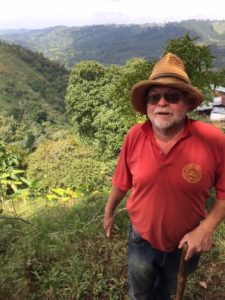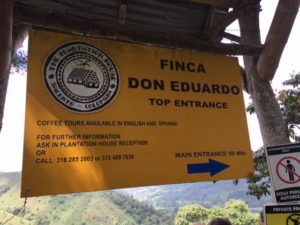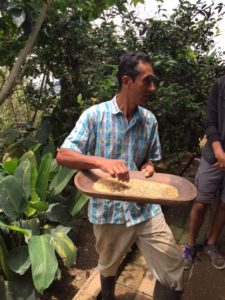You want to talk about sustainability? Organic farming is perhaps one of the best ways to contribute, and on the environmental front in general on that note. How do we make farming organic and sustainable? Just add some organic fertilizer! What does that consist of? In the words of the profound Don Eduardo, “Well it’s organic chicken shit of course!”
Who is this Don Eduardo you may ask? And what does he know anyways? Well, he goes by Don Eduardo and named his finca or farm that after settling to Colombia with his (what I imagine to be) gorgeous Colombian wife. Here they planted themselves, three kids, and a coffee farm. Don also goes by Timothy Edward, aka Tim. He is a British native ironically who named himself and his farm Don Eduardo to attract visitors. That he did. This here is how the story begins.
Just a few weeks ago I was down in Salento, Quindio, Colombia, well up from where I’m standing actually. I’m currently located in Cali, Colombia. The home of sugarcane, fresh fruit, and Salsa dancing. But Quindio, to the north is coffee country. I was lucky enough to find myself in the quaint little tourist town of Salento (you gots to go!) There I got to visit the Valle del Cocora, a state park with palm trees as high as the hills they stand on. I hiked to a park where I was face to face with hummingbirds, or colibrís. They were humming alright. I met some sweet tourist from all over the world, and got to hang with some Colombians too, in their natural habitat.
I learned a lot about coffee, organic farming, organic fertilizers, and the process of making coffee start to finish. I did this all the while taking a mini hike around this 6.5 acre farm. The farm, classified as “deliberately uncertified organic” receives its fertilizer from Houdini the mule (he tends to disappear on them– such an ass!). But why uncertified you may ask?
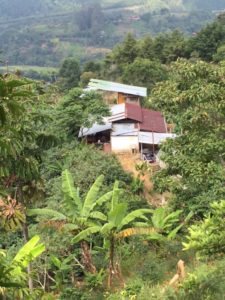
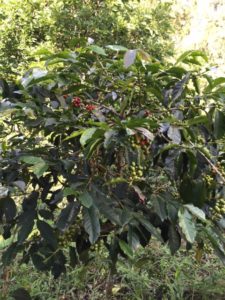
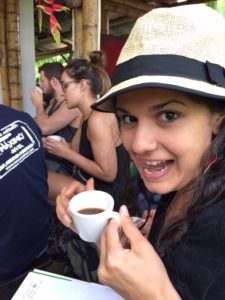
According to our friend Tim, believes that the certification only serves the certification bodies, especially in Colombia, where it is often difficult to guarantee regulation is abided by and many times organizations slip through the cracks (if the agency is even regulating). But that is another issue in itself, so I digress. He does everything on his end to ensure that the coffee he uses and the material he produces is as organic as possible. Isn’t that a concept?
Certainly it is, and it got me thinking what goes into organic farming. As consumers, it is our job to be aware and inform ourselves, but as producers they’re as responsible, if not more to ensure that it is organic as they are feeding the masses. But they themselves cannot always guarantee that. That is where it becomes ultimately up to both sides, inclusive of the regulators as mediators to ensure that what is being produced, consumed, and sold is good quality, for the greater whole of course.
After taking Don Eduardo’s tour, I know that he is doing everything in his power as a consumer to make sure that this farm is just that, good for the environment, the consumers, the visitors, and the people he has working for him. I got to meet some of his fare trade employees if you will and Vicente, who showed us how to make the coffee, seemed to be doing just fine. I would be proud to buy this man’s coffee. Lucky as I was, I got to help make some of it — well the part that starts from bean to cup anyways.
I didn’t buy because he only had a few bags and we were a big group that day. He actually makes little money off his investment at this point. He is working on launching a website, to sell the coffee. Currently he is losing money from the tours which are the thing funding the website and going back into the farm. The goal is to sell actual coffee plants that people can buy and choose to harvest the way they like. Tim will send you the GPS coordinates and a link to watch your coffee grow. You can then get the coffee into a roasting form, they send it to you wherever you are, whether it be another part of Colombia, the UK, the US, or Iceland, ready to roast and grind, in house! (These processes are done in country to preserve freshness.)
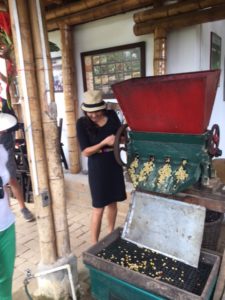
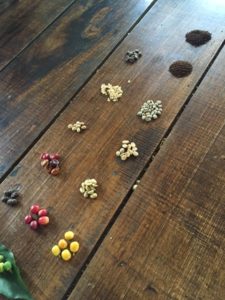
He is a decent hardworking man who like many who have planted themselves in Colombia, and seems quite content here. (I’m not going to lie, it would be hard not to be contento in Salento.) He has three daughters, two of which attend college in Bogota and Medellin. One of which he has working in the fields with other 9-year-old girls picking coffee beans, he jokes. So do I. He has 3 dogs, Ipod, Jane Bond (because she’s a girl of course) and a third Collie which we will call Lassie for now. He is the owner of the hostel Plantation house, which we were lucky enough to stay in. We actually received a $5 discount on our coffee tour for each day that we stayed at Plantation House. We got to meet some really great people from all over the globe just in that hostel, but also in the town. There were some Irish on our tour, the Brits were our neighbors, I shared the kitchen with some Polish, got to practice my Italian, and met the German vegetarian who also assisted on the farm.
If you ever get the opportunity to visit Salento, (which I highly recommend in La Zona Cafetera), stay at Plantation House. Don’t take it from me, I believe that there are some good ratings on Trip Advisor as well. Either way, you can call Tim up in English or Español as they accommodate a line for both speakers. If you call the English line, Tim will likely book for you that night at a good price. If it is a holiday weekend, he will do his best to accommodate you, but surely will find a way. Just like he did for me, the other day!

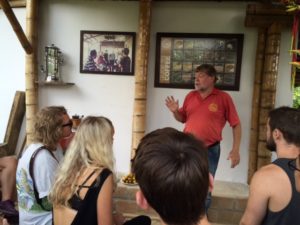

Go have a coffee, on me! Organic, green, refreshingly clean!
Happy travels! <3
Salí Maria
Links:
Photo Creds: Juan Pablo Villota


